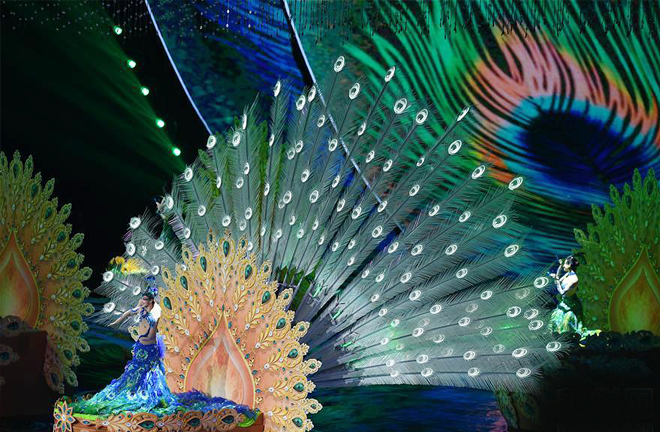CDAC calls for exchange and mutual learning

CDAC’s Asian culture carnival took place on May 15. Photo: Jin Liangkuai/XINHUA
Chinese President Xi Jinping attended the opening ceremony of the Conference on Dialogue of Asian Civilizations (CDAC) in Beijing and delivered a keynote speech on May 15.
Xi said that exchange and mutual learning is the essential requirement of the development of civilizations. Only by interacting with and learning from each other can civilizations maintain their vitality.
Exchange and mutual learning among civilizations should be conducted in a reciprocal and equal manner, and it should be diverse and multi-directional, he said. The exchange should not be compulsory, forced or one-directional.
Xi said that civilizations are not destined to clash as long as people are able to appreciate the beauty of all civilizations.
Noting that Chinese civilization is an open system formed through constant exchange and mutual learning with other civilizations, Xi said that China will surely embrace the world with a more open stance and contribute more dynamic civilizational achievements to the world in the future.
The week-long event included an opening ceremony, panel discussions, an Asian culture carnival and Asian Civilization Week, involving more than 110 activities.
American political scientist Samuel Huntington proposed the theory of the clash of civilizations in 1993 and published the book The Clash of Civilizations and the Remaking of World Order in 1996. Since then, this theory has exerted a wide-ranging influence in the international community and academia. However, many participants in the panel discussions believed that the inclusiveness and diversity of civilization is more worthy of study and respect than the so-called “clash of civilizations.”
A civilized international order should not be based on eliminating differences, but on respecting differences, said Su Changhe, executive dean of the School of International Relations and Public Affairs at Fudan University. If the differences are eliminated, then it is a great hazard to international political civilization and international political order.
The flawed theory of the clash of civilizations originated from a theory of international relations emphasizing politics and security; however, a culture-driven society regards dialogue among civilizations as an inherent feature of social development.
Swaran Singh, a professor from the School of International Studies at Jawaharlal Nehru University in India, mentioned that in the era when European powers ruled the world, Asian countries were invaded by colonists, and some countries were forced to emulate Western political models. These countries were over-reliant on their suzerains, and each colonized country was isolated from its neighbors. As such, links between Asian countries were greatly diminished.
However, Singh said that with the development of new means of transportation and communication, more efficient connections today are bridging regional differences.
Intellectuals and elites have long realized that world civilization has been in crisis in the 20th century and hoped that Asian countries could make up for the shortcomings of the existing world civilization with their own civilizations, said Yuji Miyamoto, head of the Miyamoto Institute of Asia and former Japanese ambassador to China. So far, Asia has not given an answer, which remains something it must confront. In this regard, he said that while respecting and learning from Western civilizations, Asian countries should study their own civilizations.
Solving the problems facing the international community through the civilization approach is a good direction to take, said Srikanth Kondapalli, director of the Center for East Asian Studies at Jawaharlal Nehru University. Although some problems cannot be resolved immediately, they require a forward-looking attitude. From this perspective, promoting dialogue among Asian civilizations is a good, necessary initiative, and the holding of the CDAC is a good start, Kondapalli continued.
At the same time, Kondapalli said that due to the limitations of the nation-state itself, in addition to such complicated contradictions as territorial disputes between countries, each country also faces challenges including its own development problems and ethnic issues. As such, the civilization approach also means coordination of responsibility and containment of power.
Ei Sun Oh, senior fellow at the Singapore Institute of International Affairs, asserted the importance of Asian civilizations’ confidence in themselves. He suggested developing tourism, strengthening educational exchange and promoting exchange between think tanks. Deepening cooperation between think tanks in Asian countries can effectively reduce misunderstandings and misjudgments.
He also said that exchange among civilizations is very important. The Belt and Road initiative calls for people-to-people bonds, which, to a large extent, must be realized through exchange among civilizations.
edited by JIANG HONG
